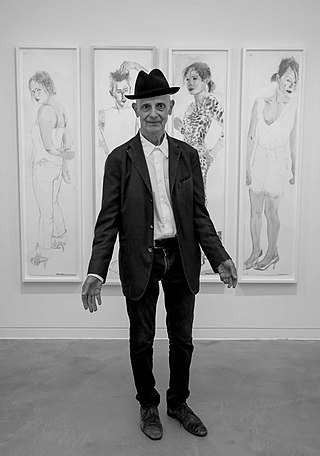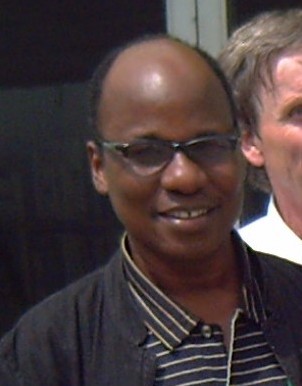Related Research Articles

The Institute of Contemporary Arts (ICA) is an artistic and cultural centre on The Mall in London, just off Trafalgar Square. Located within Nash House, part of Carlton House Terrace, near the Duke of York Steps and Admiralty Arch, the ICA contains galleries, a theatre, two cinemas, a bookshop and a bar.

Trevor Thomas Phillips was an English visual artist. He worked as a painter, printmaker and collagist.
Alexander Robert Nairne is a British art historian and curator. From 2002 until February 2015 he was the director of the National Portrait Gallery, London.
Richard Cork is a British art historian, editor, critic, broadcaster and exhibition curator. He has been an art critic for the Evening Standard, The Listener, The Times and the New Statesman. Cork was also editor for Studio International. He is a past Turner Prize judge.
Frédéric Bruly Bouabré, also known as Cheik Nadro, was an Ivorian artist.
Berry Bickle is a Zimbabwean artist who resides in Maputo. Born in Bulawayo, Bickle attended the Chisipite Senior School in Harare. Later, she attended the Durban Institute of Technology, where she obtained a national diploma in fine arts, and South Africa's Rhodes University, where she obtained a master's degree in fine arts. Bickle was a founding member of Bulawayo's Visual Artists' Association.

David Remfry is a British painter and curator. He served as the Eranda Professor of Drawing at the Royal Academy Schools from 2016 to 2018 and as a competition judge for the Royal Academy of Arts Charles Wollaston Award in 2021. In 2023 he coordinated the Royal Academy of Arts Summer Exhibition. A retrospective of Remfry’s work, curated by Dr Gerardine Mulcahy-Parker, is planned for 2025 at Beverley Art Gallery, East Riding.
Clémentine Deliss is a London-born curator, researcher and publisher.
Wendy McMurdo specialises in photography and digital media. In 2018 she was named as one of the Hundred Heroines, an award created by the Royal Photographic Society to showcase global female photographic practice.
Virginia Agyeiwah Nimarkoh is a British artist and activist, based in London. Nimarkoh was born in London, and studied at Goldsmiths College London from 1986 to 1989, graduating with a PhD in Fine Art. Her practice combines mostly photographic and curatorial projects. She also works in community development and environmental regeneration initiatives across London. She currently works mainly with food, running a raw food business and food insecurity social enterprise in London.
Contemporary African art is commonly understood to be art made by artists in Africa and the African diaspora in the post-independence era. However, there are about as many understandings of contemporary African art as there are curators, scholars and artists working in that field. All three terms of this "wide-reaching non-category [sic]" are problematic in themselves: What exactly is "contemporary", what makes art "African", and when are we talking about art and not any other kind of creative expression?

Yacouba Konaté is an Ivorian curator, writer and art critic. He is a professor of philosophy at the Université de Cocody in Abidjan, Ivory Coast.
The Dakar Biennale, or Dak'Art - Biennale de l'Art Africain Contemporain, is a major contemporary art exhibition that takes place once every two years in Dakar, Senegal. Dak'Art's focus has been on Contemporary African Art since 1996.
Veronica Maudlyn Ryan is a Montserrat-born British sculptor. She moved to London with her parents when she was an infant and now lives between New York and Bristol. In December 2022, Ryan won the Turner Prize for her 'really poetic' work.

David Thorp is an independent curator and director. He curated GSK Contemporary at the Royal Academy of Arts and Wide Open Spaces at PS1 MoMA New York, among many others. He was Curator of Contemporary Projects at the Henry Moore Foundation and was also director of the South London Gallery, The Showroom and Chisenhale. He has been Associate Director for Artes Mundi, the biannual contemporary art exhibition and prize at the National Museum of Wales, and following the death of Michael Stanley in late September 2012 was appointed Interim Director at Modern Art Oxford. He was a member of the Turner Prize jury in 2004. Since the beginning of 2005 David Thorp has been an independent curator organising and initiating various projects in the UK and abroad. Thorp has held the positions of International Adjunct Curator at PS1 MoMA New York, Associate Curator at Platform China, Beijing, Curator of the Frank Cohen Collection, one of the most important collections of contemporary art in the UK.
Amarachi Okafor is a Nigerian artist whose works have focused on culture, religion, history, gender relations, human sexuality, and topical issues, like the spread of the Ebola virus in Africa.
Jolene Rickard, born 1956, citizen of the Tuscarora Nation, Turtle clan, is an artist, curator, and visual historian at Cornell University, specializing in Indigenous peoples issues. Rickard co-curated two of the four permanent exhibitions for the Smithsonian’s National Museum of the American Indian.
Julie Crooks is a Canadian curator, researcher and instructor. She has been the head of the department of Arts of Global Africa and the Diaspora at the Art Gallery of Ontario since its founding in 2020.
Thiagarajan Kanaga Sabapathy, better known as T.K. Sabapathy, is a Singaporean art historian, curator, and critic. Sabapathy has written, researched, documented, and supported contemporary visual art in Singapore and Malaysia for four decades. He has held positions at the National University of Singapore, Nanyang Technological Institution, and National Institute of Education as a lecturer of art history. Sabapathy further established and headed pioneering art research facilities in Singapore, such as the Contemporary Asian Art Centre (2001–2004) and subsequently, Asia Contemporary (2015–).
Freddy Tsimba is a sculptor and visual artist from the Democratic Republic of Congo. He has made sculptures from bullet casings collected on Congolese war battlefields. One of his artwork entitled Au-delà de l'espoir was commissioned by the municipality of Ixelles in Brussels and installed on the corner of Chaussée de Wavre and Longue-Vie street in Matonge district.
References
- 1 2 3 4 "africa95 Archive". Archives Hub.
- ↑ Attias, Elaine Mitchell (26 December 1995). "An Intercontinental Showcase for Africa : Britain Is First Stop for the Most Comprehensive Expression of African Culture Ever Assembled". Los Angeles Times.
- ↑ van Leyden, Nancy (1996). "Africa95. A Critical Assessment of the Exhibition at the Royal Academy (Africa95. Évaluation critique de l'exposition de la Royal Academy)". Cahiers d'Études Africaines. 36 (141–142, Images): 237–241. doi:10.3406/cea.1996.2011. JSTOR 4392677.
- ↑ "WHY AFRICA? The curators of three major Africa '95 shows explain their aims" . The Independent . 16 October 1995. Archived from the original on 2009-10-26.
- ↑ "Publications – Africa: The Art of a Continent". Tom Phillips. Retrieved 18 April 2021.
- ↑ "AFRICAN SUMMER The African Prom". Radio Times. 21 September 1995. p. 82. Retrieved 11 May 2021.
- ↑ Cathcart, Jenny (2019). "19: African Music on BBC TV | The African Prom". Notes from Africa: A Musical Journey with Youssou N'Dour. Unbound Publishing. ISBN 9781789650488.
- ↑ "Black History Month 2014: Archives of africa95". Special Collections, SOAS Library. SOAS University of London. Retrieved 3 March 2021.
- ↑ Busby, Margaret (10 January 2005). "Vision for change". New Statesman . Retrieved 4 March 2021.
- ↑ "Arts Council England Makes Two Key leadership Appointments". Arts Council England. 5 December 2006. Retrieved 4 March 2021.
- ↑ Duff, Oliver (19 November 2004). "The rich art of Africa goes on show to dispel 'caricature' of a dark continent". The Independent.